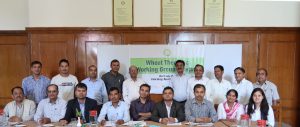Engagement with Prime Minister’s Agriculture Modernization Project in Nepal

Nepal (CSISA) – In July 2017, the Cereal Systems Initiative for South Asia (CSISA) and the Prime Minister’s Agriculture Modernization Project (PMAMP) jointly held a working group forum, aiming to unify and coordinate the efforts of 21 public and private stakeholders working on research, extension and private sector development for wheat in Nepal. The forum emphasized the need to identify proven best practices for sustainable intensification of wheat, explored possible scaling pathways for knowledge and technological innovations and identified knowledge gaps and areas for future research. The group also laid out a strategy for development of a joint work plan for the 2017–18 wheat season.
The Government of Nepal recently endorsed a new twenty-year agriculture development strategy that charts a progressive course of action to revitalize agriculture as an engine for economic growth and domestic food security. At the center of this strategy is the recently-launched PMAMP, designed to enhance productivity and commercialization of major cereals, fisheries, fruits and vegetables over the next decade. The PMAMP has laid out a structure of super zones -commercial areas of more than 1,000 ha, zones – areas over 500 ha, blocks – over 50 ha and pockets – over 10 ha, these are defined areas across the country that receive government support to produce particular crops intensively.
CSISA has been closely working with PMAMP from its inception in 2016 by providing technical backstopping at the central and local levels for the wheat, maize, rice and farm mechanization programs. CSISA sees PMAMP as a key mechanism for scaling up sustainable intensification technologies in Nepal due to the large geographic reach of the program.
Since early 2017, CSISA has provided PMAMP staff technical guidance on seasonal activity planning and has facilitated cross-learning events and ‘trainings of trainers’ to super zone and zone technicians and operational committees on how to implement and out-scale sustainable intensification technologies. CSISA has also developed training materials, educational videos and other extension materials for utilization by the cereal- and mechanization-based programs.
In the recent forum, Rajan Dhakal, Senior Agriculture Officer at PMAMP, remarked that the discussions were instrumental in identifying technical priorities for wheat and revealing how the efforts of diverse partners can contribute to the food security goals of the Government of Nepal.
Similarly, Yagya Prasad Giri, Chair and Director of Crops and Horticulture at National Agriculture Research Council (NARC), said he appreciated CSISA’s efforts to facilitate discussion and coordination across a diverse set of stakeholders through a common and action-oriented platform.
Drawing on the success of the wheat forum, PMAMP is planning to convene meetings for maize and rice with support from NARC, CSISA and private sector partners within the next two months. CSISA will continue to provide technical support for program implementation and scale-up, as well as advice on seasonal planning, in recognition of the value of public-private collaborations around sustainable intensification issues in Nepal.
The Cereal Systems Initiative for South Asia is led by the International Maize and Wheat Improvement Center and implemented jointly with the International Food Policy Research Institute and the International Rice Research Institute.
This article was authored by Mina Devkota.
Photo credit: CIMMYT
